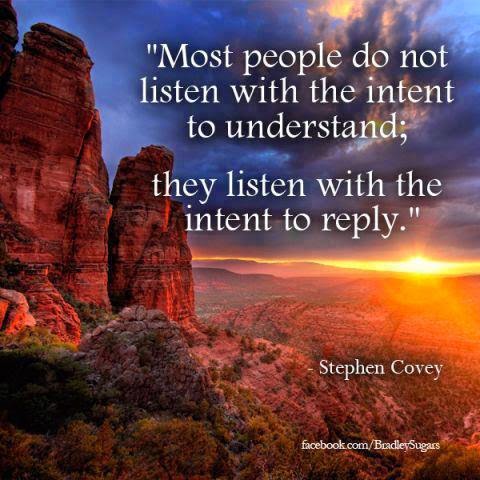I’ve recently read articles and posts on
the net saying that you should never ask a depressed person why they are
depressed. (For example http://psychcentral.com/blog/archives/2007/08/23/what-are-you-so-depressed-about/)
And on reading, while I thought much of the information was very helpful, it
left me feeling that if I was a depressed person’s loved one I would probably
feel afraid to ask them anything about the depression. And that’s the last
thing you want. Getting a person to talk about their depression is a major step
in helping them through it.
Asking ‘why’ is actually a common human
response when confronted with something we don’t understand. That’s because
often when we hear someone is having problems our first reaction is that we
want to help them find a solution, so of course to do that you need to work out
why they have the problem. But what a depressed person needs from their loved
ones isn’t someone to fix all their problems as such, what they first and
foremost need is someone who will listen and try to understand them - to ‘be on
their page’. So if you happen to be
talking to someone about their depression and your first reaction is to want to work
out why are they depressed, just take a step back and see if that means you are
(perhaps subconsciously) heading for the ‘fix-it’ approach.
Now, while jumping in with a blunt ‘why are
you depressed’ is not usually a good idea, there is a place for exploring the 'why' question. But with some conditions. You must have built a relationship with the
person first… even a counsellor has to have a developed rapport before they can
get results with asking tricky questions.
You may think that just being in the depressed person’s life is enough
of a relationship for you to have the right to ask why. But no, they need to feel
that you really care, that you want to spend time with them finding out about
how they are feeling. Even Job’s friends sat with him without saying anything
for 7 days before they started giving advice: “Then they sat down on the ground with
him for seven days and seven nights with no one speaking a word to him, for
they saw that his pain
was very great.”(Job 2:13) This was a custom for anyone who was grieving in
those times. And I think it’s a great example… to just BE with a person…to
experience and get an idea of their situation and their emotions before saying
anything.
When, and only when this is established can
you go in with difficult questions. But even at this stage you need to be
careful. You need to word your questions gently and with absolutely no sign of
judgment. Depression makes people very sensitive. You must approach them with
kindness and sensitivity.
When I experience a new episode of depression, I have a couple of friends who have basically earned the right to ask me if i know of anything that may have triggered it (a gentle way of asking the 'why' question). in the past they have demonstrated to me that they are not judgmental and really do want to understand and help me. And that makes it ok because they left me feeling like they care and are really interested in learning about the depression I experience. In fact them asking me questions like this actually can reinforce their caring and support.
If you ask someone how they are and they actually admit to depression, they are probably stepping outside their comfort zone in even telling you that they have it. Be kind in your response. Once they know that you are ‘on their side’ and are really interested in understanding them, you can ask why they are depressed in a way that is not threatening, just be careful and sensitive in how you word things.
If you ask someone how they are and they actually admit to depression, they are probably stepping outside their comfort zone in even telling you that they have it. Be kind in your response. Once they know that you are ‘on their side’ and are really interested in understanding them, you can ask why they are depressed in a way that is not threatening, just be careful and sensitive in how you word things.
I think that in actual fact you can say and
ask almost anything if you follow these guidelines.
I would love to hear your experiences on this topic. Perhaps you don't agree, and thats ok too. We can all learn from each other. Please feel free to share your thoughts in the comments section below.
I would love to hear your experiences on this topic. Perhaps you don't agree, and thats ok too. We can all learn from each other. Please feel free to share your thoughts in the comments section below.


No comments:
Post a Comment